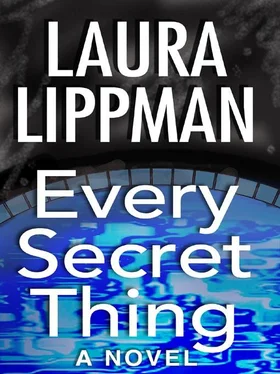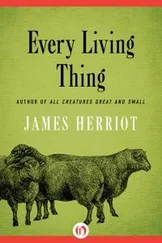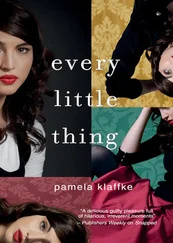“Problem with the medical records?” Nancy guessed.
Lenhardt nodded. “Middlebrook, where Alice was held, is finally under renovation, and the nonactive files have been put away in some storehouse for the time being. They’re going to try and find them, but I got the feeling they honestly don’t know where they are. Shechter, a psychiatric unit at one of the privately run juvenile facilities, is stonewalling us, says they sent the files to a state agency upon Ronnie Fuller’s release. But they’re not sure if it was Juvenile Services or Health and Mental Hygiene.”
“Seems like a lot of work,” Infante said, “for information that may not even help us.”
“Well, there’s blood, and you can’t ignore that,” Lenhardt said. “Blood is good. But I’ve been thinking: This is a case about what’s not there, too. And what’s the primary thing that’s not there?”
He looked at his two detectives expectantly and Nancy couldn’t help wanting to get the answer first. She studied her sergeant’s face for a clue, a tell, and saw his eyes slide to the right, toward the stack of videotapes on Infante’s desk. These were tapes from the store’s security cameras and the mall security cameras at the various exits. They had watched them several times and caught a glimpse of Maveen Little and her boyfriend, seemingly looking for the girl. But-
“Brittany Little,” Nancy said. “Brittany Little is missing. Not a single security camera caught her. Which is possible, but not plausible.”
“If a stranger took a kid, he’d have to snatch her fast”-Lenhardt hugged a phone book to his chest to demonstrate-“and even then, she’d probably yell. It’s more likely he enticed her out with something.”
“We talked to the shift supervisor for mall security,” Infante said, “and the security guard from Value City. An off-duty city cop, pretty sharp. He pointed out that if the cameras caught everything, there wouldn’t be a shoplifter walking free today.”
“The mom came looking for him, and he said she was genuinely distraught,” Nancy put in. “She was almost hysterical.”
“Well, if your boyfriend killed your daughter, you would be genuinely distraught, too. Why don’t you go back to Westview, check out the exits and the placement of the cameras? This lady, this Cynthia Barnes, got us agitated over the resemblance between her girl and our missing one. She was on the phone so fast the night it happened that we barely had time to think this through our ownselves. Granted, the lady’s got reason to be antsy. But that doesn’t mean we need to be.”
She was on the phone so fast the night it happened -but Cynthia Barnes had called Nancy Saturday morning, saying “I just spoke to your sergeant.” Nancy’s mind jumped back to the Friday evening the child had disappeared, the decision to treat it as a homicide, even with evidence like the hair and the jumper raising the possibility of an abduction. Then there had been Lenhardt’s insistence on moving Infante and Nancy up in the rotation. Infante had followed Lenhardt into the bathroom, arguing all the while, coming out furiously resigned.
Coincidences happen, Infante had said. Look at sarge and the Epstein case. And Nancy hadn’t asked any more questions-not because she was scared to reveal her ignorance of something called the Epstein case, but because she didn’t want to find out that her involvement in this case was anything but a coincidence. If Lenhardt was making her work the Brittany Little case because of her old connection to the Barnes case, then he was testing her. If he was testing her, he must not trust her.
“Nancy?”
“What?”
“I’d like to get to Westview sometime this week,” Infante said, standing over her. “You want to stare into space, stirring coffee, you can do that in the car.”
“Look at my pitcher, Miz Manning. Do you like it?”
“It’s beautiful, Gerald.”
The boy frowned. He had a perfectly round head, big for his eight-year-old body, with close-cropped hair. He looked like a black Charlie Brown, although he had none of the cartoon character’s sheepishness. “My name’s Ja-leel.”
“Of course. Ja-leel.”
“What about mine? You like mine?” A girl held up her painting, heedless of the way the fresher colors sent tracks down the paper. She wore her hair in plump pigtails, trapped by plastic barrettes, three tails in all, with parts so straight and neat the sections might have been partitioned with a ruler. This hairstyle never went away in Baltimore.
“It’s exquisite, Bonnie.”
“Bon- ay, B-O-N-E-T,” the little girl corrected. “My name is Bonet.”
“That’s right, honey.” Jesus Christ, Helen thought. Fifteen kids and maybe two had names that weren’t some random array of vowel sounds. She was all for self-expression, but you had to know the rules before you were free to break them. Look at e. e. cummings.
She was teaching arts and crafts at a city-funded day camp, something she had done every summer since Alice went away. If she had it to do over again, she wouldn’t have signed up for a session during Alice’s first summer at home. But she had made the commitment back in March, forgetting how her life was about to change. Besides, she had gotten used to the extra money, and giving up the job was akin to taking a 5 percent pay cut.
This school was on the city’s North Side, in one of the city’s richest neighborhoods, but the children were all black. The white families who lived in the huge houses around the school wouldn’t dream of sending their children there, not even for day camp. Welcome to apartheid, Baltimore style. People rationalized the city’s divisions by speaking of the private school tradition in Baltimore, of the strong presence of the Catholic Church, but the bottom line was that it was a segregated city. The whites who couldn’t afford even parish schools had fled to the county. When middle-class African-Americans followed them, chasing the same dreams, the whites decamped to counties even farther out.
Alice would have been the only white child in her elementary school if Helen had sent her there. Which was fine by Helen, but not by Alice. The girl’s fear of being different was almost pathological. Another child might have gloried in standing out, but all Alice had ever wanted to do was fade in, go along, get along. Helen’s mother had defended this characteristic, recognizing it as her own. “Well, dear, perhaps if she had a father-or even knew who her father was-she might not care as much about seeming normal.” It was the closest thing to a rebuke that Helen’s mother had ever dared to utter.
So Helen had enrolled Alice in the parish school and watched in dismay as she gravitated toward the most ordinary girls, the popular girls, the ones destined to make Alice’s life hell once they were adolescents. But it was what Alice wanted. Alice, not Helen.
That’s why it had stung to see race become a focal point in the coverage of Alice’s crime. That was the one identifying fact, besides their ages and their neighborhood, that had been attached to the “two girls.” They were white, their victim was black. One lawmaker had even speculated about trying the two girls for a hate crime. Feelings ran high. For a moment, the city seemed capable of boiling over, all its inequities and grudges and hatreds crammed into this one anomalous incident. It was as if people needed to imbue what happened with meaning. But if Helen was sure of anything in her life, it was the very meaninglessness of what her daughter had done.
“Lookit my house, Miz Manning. That’s my house and my mother and my brothers.”
Another little boy-Dumas? Dunbar? Ducasse?-was thrusting his picture in her face. The house was clearly not his, for it was a detached frame house, white with shutters and a picket fence, a curl of black smoke coming from the chimney. If he had even seen such a house, it was on television. Or walking through this neighborhood that didn’t want him, where the local grocery store refused to allow more than four “students” inside at any one time, although the rule didn’t seem to apply to the plaid-skirted girls from the private school. In a convenience store last spring, Helen had listened with dismay as the black middle-schoolers taunted the Middle Eastern counterman who tried to shoo them away. “No mo’ student! No mo’ student in sto!” They gloried in his bigotry, turning it back on him.
Читать дальше












